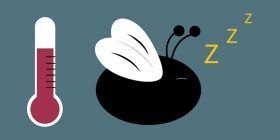Humans and fruit flies may have not shared a common ancestor for hundreds of millions of years, but the neurons that govern our circadian clocks are strikingly similar.
Now, University of Michigan researchers have made a discovery in fruit flies that may teach us a little more about our own sleep cycles. Using the fruit flies, they showed how circadian clock neurons use thermoreceptors to constantly monitor the temperature of their environment. They found even mild changes in temperature have physiological effects on clock neurons that control sleep timing.
This discovery will help researchers understand how neurons are using environmental temperature in addition to light to regulate sleep timing in mammals, including humans. Their study will be published Feb. 21 in Nature.
"Decades of work from recent Nobel Prize winners and many other labs have have actually worked out the details of how light is able to adjust the clock, but the details of how temperature was able to adjust the circadian clock were not well understood," said Swathi Yadlapalli, first author of the study and a postdoctoral researcher in the U-M Department of Molecular, Cellular and Developmental Biology.
Read more at University of Michigan
Image: Illustration of a fly sleeping. (Credit: Katie Beukema)


